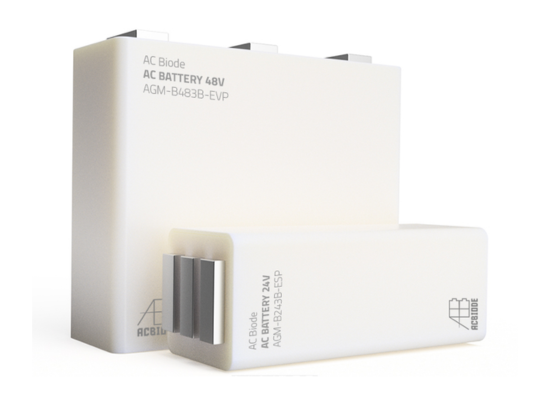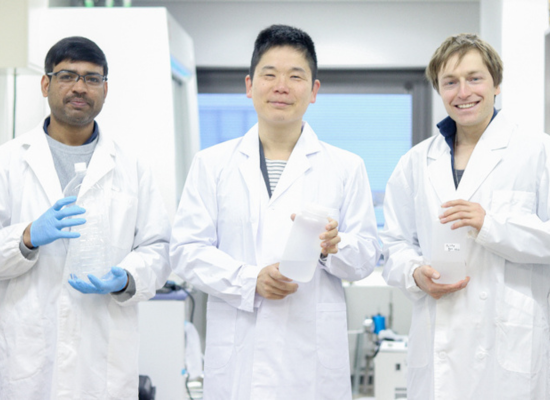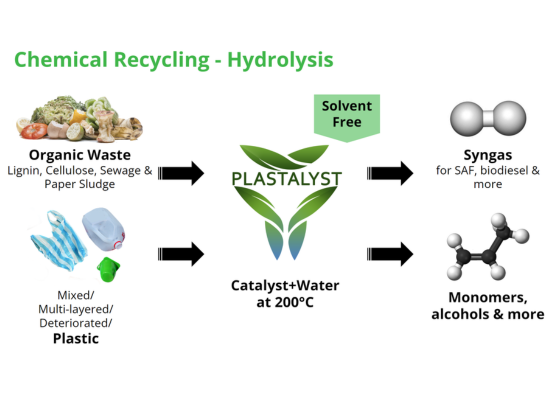Wired together by a shared vision
AC Biode´s history started with the culmination of three brilliant young minds at the university of Cambridge in 2017/2018. At the time, Tadashi Kubo, now CEO, was pursuing his MBA after working in trading and investment in Japan, focusing on batteries, energy, petrochemicals and mobility. During his studies, he met Robert Kunzmann, now COO, who was conducting research at the institution specialising in sustainable transportation, and Dr. Mizusawa, now CTO, a researcher on material science, catalyst, and batteries from Kyoto University. The young professionals soon discovered that they all shared a passion for environmental sustainability and the fight against climate change.
The inspiration for their first product emerged during a discussion about the inefficiencies of current energy storage methods. Although electric vehicles operate on alternating current, they still rely on direct current batteries, which leads to significant energy losses during conversion.
With his expertise in material science and chemical reactions, Dr. Mizusawa devised a way to build a battery capable of storing alternating current, a concept that had previously only existed in theory. This spark of innovation led the team to secure a seed investment from EIT InnoEnergy and officially founded AC Biode in 2019. Due to Brexit, the investors encouraged the company to move to the EU, particularly Benelux, where EIT is located. The team chose Luxembourg as it offered a strong support network and access to funding.
However, the global pandemic soon created financial challenges for the young company, making it difficult to maintain a research facility. To continue their operations, the company established a laboratory in Kyoto, Japan, where lockdown restrictions were minimal. Today, AC Biode maintains its headquarters in Luxembourg while also operating offices in the UK and Japan. The company has since grown to a team of 12 members.
The start-up defined their mission as
“using chemical technology to contribute to reducing global greenhouse gases, solving global garbage problems including marine plastics, and improving recycling rates”
, explains Tadashi. The start-up name describes their innovation: “Biode” is the name the team gave to the electrode that is put between anode a cathode and is responsible for creating an alternating current in the device.
A colourful spectrum of more sustainable solutions
Electricity exists in two forms: alternating current (AC) and direct current (DC). While everyday electronic devices such as smartphones, laptops, and household appliances operate on direct current, alternating current is primarily used to power the motors of electric vehicles.
In conventional energy conversion processes, up to 35 percent of energy is lost when powering a DC battery from an AC current and translating it to AC current for the device. In addition to energy inefficiency, conventional lithium-ion batteries present environmental concerns due to their reliance on rare metals.
In a direct current battery, the voltage flows in a single direction from one terminal to another, whereas in an alternating current battery, electricity must move back and forth at a specific frequency. Developing a battery capable of storing alternating current posed a significant technical challenge, as it required either rapidly switching the charge of the terminals or introducing an intermediary element to balance the charges between the anode and cathode.
AC Biode successfully addressed this challenge. The key innovation lies in its unique electrode, named “Biode,” which is positioned between the anode and cathode. This component enables efficient alternating current storage while improving performance.
The AC Biode battery is up to 30 percent more compact than conventional batteries, reduces energy conversion losses, and operates more safely due to its lower electrical resistance, which minimizes heat generation and extends battery life. Furthermore, its production process utilizes existing materials and battery manufacturing lines, making large-scale adoption both feasible and cost-effective, thus creating more incentives for producers to change towards a greener solution. On their mission to power the future, the company has already secured two patents in Japan and has filed patent applications in Europe and internationally.
The AC Biode battery is more sustainable than conventional batteries primarily because it requires fewer existing materials for production and lasts twice as long, making it both more cost-effective and more environmentally friendly.
Beyond its work in energy storage, AC Biode has also developed several other cutting-edge technologies. One of its most significant innovations is Plastalyst, a chemical catalyst that enables the recycling of even the most difficult plastics at low temperatures, allowing them to be transformed into monomers for new plastic production. According to the United Nations, only 9 percent of the 8.3 billion tons of plastic waste generated over the past 65 years has been recycled, largely due to inefficiencies in existing catalysts and the high costs of recycling facilities. Traditional plastic waste elimination methods rely on high-temperature incineration, which is only accessible to large-scale companies. Plastalyst provides a cost-effective and scalable alternative by combining the affordability of mechanical recycling with the ability to process a wide range of plastics rather than sending them to incinerators or landfills.
“Plastalyst is not just one chemical reaction. It is our vision to create a world, where all plastics are recycled”
, explains Robert. Unlike other technologies, it operates at just 200°C and uses water as a solvent, significantly reducing energy consumption and operational costs. Moreover, it does not rely on precious or rare-earth metals, making it a more sustainable solution. The catalyst can be continuously reactivated and is made from a well-established material that has been used and recycled for decades.
In addition to Plastalyst, AC Biode has developed several other environmentally friendly technologies.
Next up at AC Biode
AC Biode has already made a significant impact on the market. The company has secured sales in over 15 countries, launched three paid pilot programs, won more than 30 innovation awards, raised 4.8 million USD in funding through grants and prizes, and signed agreements with leading global chemical companies.
Looking ahead, the company is expanding its production of Plastalyst and is working on a new initiative to utilize waste from the palm oil industry to produce hydrogen and other valuable biochemicals. With support from the Temasek Foundation, AC Biode is constructing a 100-liter demonstration plant in collaboration with the national energy provider PLN.
With their innovative approach, AC Biode, who joined the ISC3 Global Start-up Service October 2020, remains fully charged for success and actively contributes SDG1 (No Poverty), SDG3 (Good Health and Well-being), SDG5 (Gender Equality), SDG7 (Affordable and Clean Energy), SDG8 (Decent Work and Economic Growth), SDG11 (Sustainable Cities and Communities), SDG12 (Responsible Consumption and Production), SDG13 (Climate Action), SDG15 (Life on Land).




